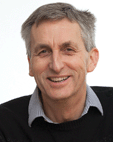DOI: 10.1039/C2CC90093A
(Profile)
Chem. Commun., 2012, 48, 4797-4797
Interview with David Parker
| ||||||
Do you remember what it felt like to publish your first ChemComm article?
In the days of the typewriter and the Rotring pen, and based on work from the first year of my DPhil, the stir caused by seeing your name highlighted in print certainly managed to raise more than just a smile. The topic was the definition of intermediates in chiral catalysis (DOI: 10.1039/C39800000342), and came after many hours let loose on a ‘new’ 300 MHz NMR spectrometer.How has your research evolved from your first to your most recent article?
From rhodium phosphine complexes to emissive lanthanide complexes (DOI: 10.1039/C1CC14904K), a long and winding road can be traced. A unifying theme has been chirality. Through pretty much everything we have studied, elements of chirality can be found. In early work in Oxford and Strasbourg, I was imbued with the need to understand mechanism, and thereby appreciate function; such thinking is still apparent today, I trust; otherwise you risk becoming a reporter of observation, and may easily be enticed by undue speculation and unnecessary hyperbole.What do you like most about publishing in ChemComm?
The enthusiasm, professionalism and courtesy of the staff has always been apparent at all levels of interaction. This leads to quick turn round times, and when you are at a conference, an occasional beer at the bar.What aspect of your research are you most excited about at the moment?
The prospect of sending designed molecules to particular places at a given time, that can relay back information telling us about their local environment, whether it be ionic composition or chirality.What is the best part of your job?
Having the opportunity and intellectual freedom to interact with young, talented and enthusiastic co-workers and collaborators, who are prepared to share an idea on paper, and translate it into molecular reality.What is the secret to success in scientific publishing?
This answer I shall bounce back to the publishers: you need to ensure that you identify the best referees: they should understand and appreciate the paper in front of them, have the patience to examine the work carefully and the grace to give suggestions and commentary that is of assistance to the authors. Identifying rigour and originality is rather topical at the moment; in my book, such issues come first, before any thinking about “impact”.What is your advice to young emerging scientists?
Strive to explore your scientific dreams and aim to realise your expectations. Be patient. Examine the current funding mechanisms, and where there are large pots of money, either engage in the necessary chemical prostitution to gain support or, if not aligning with your skill base, steer well clear. Take the advice of colleagues who can assist with preparing the necessary but often tedious grant proposals; there is still some space left to talk about science in most of them.What do you do in your spare time?
In no particular order: pursuing a white ball in a random walk punctuated with a few swings; cricket and football (nowadays observation rather than participation); walking up and occasionally running down the hills of the north; gentle gardening (mostly targeted devastation) and spending time with the family.By the time I'm 100 I would like to have……
....observed the fulfilment of my genetic and scientific offspring along their chosen paths.| This journal is © The Royal Society of Chemistry 2012 |

